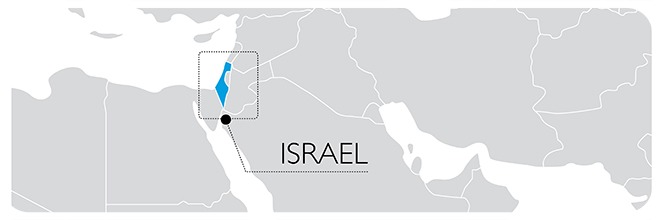Though political instability slowed tourism in Israel at the end of 2012, the market is experiencing growth — and they have big plans for the future. Thinking about investing? Consider these statistics on the hospitality industry in Israel:
Israel As A Nation
With 7.7 million permanent residents (75 percent Jewish, 20 percent Arab) and 200,000 guest workers (mainly from Southeast Asia), Israel saw a 3.5 percent growth rate for its $242.9 billion GDP last year, down from the 4.7 percent growth seen in 2011.
Current International Guest Intake
Last year, 3.5 million international tourists traveled to Israel, up four percent from 2011 despite political turmoil at the end of 2012. Of these, 2.9 million spent the night (a two percent increase), while 625,000 — 18 percent of the total tourists — were day-visitors, many of whom arrived on cruise ships.
Sixty-two percent of travelers were also first-time visitors.
International Travelers to Israel by Nationality
The U.S. (610,000 visitors, 18 percent of the total intake) and Russia (590,000, an 18 percent increase from 2011) topped the list of international travelers. Visitors from France, (300,000), Germany (230,000), and the U.K. (208,000) also contributed, while guests from China are up 27 percent.
It’s important, however, to remember that while the number of Russian guests saw a dramatic increase, a large number of these travelers — 36 percent — stayed in Israel only for a day trip.
How Do These Numbers Compare To Other Countries?
Israel’s 3.5 million visitors doesn’t come close to equaling Greece’s 17 million, let alone the 32 million tourists who traveled to Turkey in 2012. Part of this gap may be due to the fact that traveling in Israel is more expensive, but the region’s political instability also plays a role.
Domestic Tourism Numbers and Revenue
2012 saw roughly 16.5 million domestic overnight stays, a three percent increase from 2011, bringing in an estimated revenue of $2.7 billion.
International Tourism Revenue in Israel
Last year’s tourism revenue from international tourists totaled $4.6 billion. When paired with domestic revenue and income made from outbound travelers, Israel is earning an estimated $9.3 billion from the tourism industry — a four percent increase form 2011.
This money supports eight percent of Israel’s jobs (currently around 163,000 workers, a three percent increase from 2011) and contributes seven percent of the country’s GDP.
Reasons For Travel
Religious tourism dominates the Israeli hospitality sector, with 29 percent of all travelers journeying on a pilgrimage. Another 24 percent are simply passing through the country, and 12 percent are on business. Only nine percent of the guests are actually labeled as on “vacation” by government statistics.
Interestingly, medical tourism is on the rise, generating $100 million.
Current Hotel Stats for the Hospitality Industry in Israel
At the end of 2012, 340 hotels (47,900 rooms) were operational. Overnight guests saw a slight increase from 2011, totaling 22 million bed nights and a 76 percent occupancy rate. Only 9.7 million of these nights, however, were used by international tourists — a three percent decrease from the previous year.
Domestic Travelers Are Spending More Nights at Hotels
Twelve million of 2012’s bed nights — 64 percent of the overall total — were used by Israeli tourists, a four percent increase from 2011
Israeli Government’s Financial Commitment
The Israeli government is now offering grants to companies looking to build or expand their hotels. For 2012, they spent $52.9 million on projects to build, expand, and improve 37 hotels.
What Is The Upcoming Expansion Going To Look Like?
Last year, 6,000 new hotel rooms were either under construction or in planning stages, with another 1,750 rooms approved for construction.
How Much Money Are New Hotels Getting in Israel?
Depending on their location, new hotels given a grant have received between 20 and 28 percent of the total investment. In 2012, the largest grant awarded was $12.9 million to a 250-room hotel planned for Jerusalem.
Grants Depend on Location
With 77 percent of all tourists visiting Jerusalem (the highest percentage in all of Israel), hotels constructed here can expect a government grant worth up to 28 percent investment. Elsewhere, the average is 20 percent of investment, with grants given out in Nazareth, Ashkelon, Acre, Haifa, and Nahariya.
Other Popular Tourist Cities in Israel
After Jerusalem, Tel Aviv-Jaffa receives the second highest rate of guests — 56 percent. Known for its youthful population (23.5 percent are between 25 and 34), Tel Aviv is a major trendsetter for Israel’s F&B. The Dead Sea region follows (51 percent), then Tiberias (44 percent).
New Hotels Coming to Israel
Scheduled to open in November of 2013 is the $150 million Waldorf Astoria (226 rooms). A Herods Hotel in Herzliya (250 rooms) is also soon-coming, following the early 2013 opening of a Herods Dead Sea property. Kempinski is opening a 220 room hotel in Tel Aviv.
What About Food and Beverage?
Israel’s 15,000 restaurants, 32 percent of which are kosher certified, generate $3 billion. Since 2009, the market has grown 15 percent, though, in the second quarter of 2012, it shrank 1.7 percent, compared to 2011. By 2014, the F&B market is expected to grow 5 percent.
Fast Food on the Rise
Currently worth $1.2 billion, Israel’s fast food market has, over the last seven years, doubled its sales. Since 2004, the market has grown 37 percent, with an additional five percent growth expected this upcoming year. Mediterranean food, pizza, and hamburgers are popular, with 4,600 restaurants specializing in these styles.
As of 2013, there are nearly 1,500 more fast-food establishments than full service restaurants.
Coffee Scene in Israel
The roughly 1,500 coffee shops in Israel generate $510 million, with the market expected to grow by 5 percent in one year. Aroma Espresso Bars (106 locations) and Café-Café account for half of the market. Starbucks and Dunkin’ Donuts have been met with limited success.
Take-Out Venues Are Limited
Currently, there are only 72 businesses that are 100 percent dedicated to the take-away/home delivery.
Culinary Tastes in Israel
Middle Eastern food is, naturally, popular in Israel, along with Eastern European, North African, traditional Jewish cooking, and Mediterranean foods. Beef and seafood are particularly popular when customers dine out.
Who Are the Big Players in Israel?
Tabasco Holdings Ltd, (who operates Pizza Hut and KFC in Israel) currently holds the largest share of Israel’s quick service restaurant market — 2.2 percent in 2011. Other key franchise players include Yum! Brands Inc., Domino’s Pizza Inc., McDonald’s Corp., Burger King Holdings Inc., and Sbarro Inc.
Key Takeaways
- There are 340 hotels (47,900 rooms) in Israel.
- The occupancy rate for Israel’s hospitality industry is at 76 percent.
- New hotels in Israel have received grants of 20 to 28 percent of total investment.
- Israel’s 15,000 restaurants generate $3 billion.
Ready to learn more about the hospitality industry in Israel and the Middle East? Subscribe to our free newsletter.

